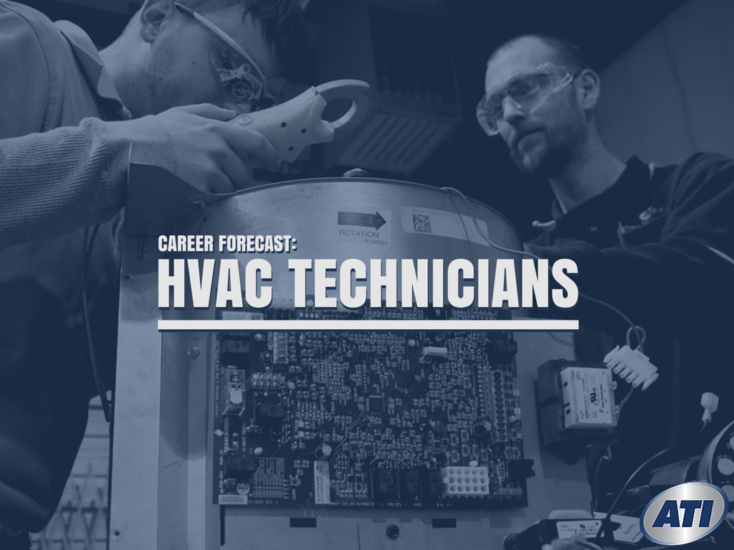What Math Do I need to Know for HVAC Degree Programs in Norfolk, VA?

Let’s face it, not that many people get excited about math, but they do get excited about career possibilities. And some of the best careers use a little math.
One of the most versatile and interesting careers is commercial and residential HVAC (heating, ventilation, and air conditioning). Homeowners and commercial property owners are no longer satisfied with their neighbor’s Uncle Joe, who has no formal training, but claims he can sense when a machine is fixed, for maintenance and repairs. They want professionals who have had technical training and formal education.
The Role of Math in HVAC
It seems almost every field employs technology, and that includes HVAC. Technology will never replace skilled professionals, but it certainly makes the math easier! As a HVAC professional, you may be using software that helps you configure energy savings or ROI (return on investment). Your customers may want to know how much money they will save with lower heating and cooling bills.
“A technician often has to sketch or design ductwork and the other parts of an HVAC system. Sometimes you have to sketch the room or building you are working with,” says Math for the Technician. “This means working with lines, angles, squares, rectangles, circles, and other shapes.”
HVAC Classes and Curriculum
A degree in HVAC Technology with Service Management can give you the skills to work with HVAC equipment. Perhaps more importantly, it can give you an educational edge that can lead to management and supervisory roles. Some of the classes you will take can develop your math skills for practical use in everyday HVAC maintenance and service:
- Accounting Ethics
- Air Conditioners
- Computer Applications
- Direct Digital Controls
- Domestic/Commercial Refrigeration
- Electricity and Circuits
- Electricity/Schematics
- Fundamentals of Technology
- Heat Pumps/All-Weather Systems
- Heating Systems
- Industrial Psychology
- Occupational Health and Safety
- Pipe Brazing/Ducting and Air Movement
- Safety, Science/Principles of Air Conditioning
- Service Management
- Sheet Metal Fabrication
- Speech Principles
- Technical Writing
- Troubleshooting, Repair, and Installation
A formal education tells potential employers you are serious about being a HVAC business professional. As you enter a competitive job market, your degree could put your resume on top.
What Path Can Your Career Take?
As you pursue your career in HVAC, you may qualify for jobs using these titles:
- Ammonia Refrigeration Technician
- HVAC Professional
- HVAC Service Technician
- HVAC Specialist
- HVAC/Refrigeration Technician
- Refrigeration Mechanic
- Refrigeration Operator
- Refrigeration Technician
- Transportation Refrigeration Technician
More than Math
Because HVACR (heating, ventilation, air conditioning, and Refrigeration) systems have become increasingly complex, employers generally prefer applicants with postsecondary education… –Bureau of Labor Statistics
The Bureau of Labor Statistics (BLS) is a conservative but reliable source of information about careers and jobs in the United States. The BLS says the job outlook for heating, air Conditioning, and refrigeration mechanics and installers shows a 15% increase through 2026. That’s a much faster increase than most careers.
HVAC technicians need math to calculate the correct load requirements to ensure equipment properly heats or cools. But in addition to the classes you will take, you should also develop these qualities and skills:
- Customer service – You’ll often work in customers’ homes or business offices. Reassuring them by being polite, punctual, and professional is important.
- Detail-oriented – Keeping organized records of every transaction should include what work was performed, time spent, equipment used, and invoice/billing information.
- Mechanical – Climate control systems may need to be programmed. You should know how to take them apart and put them together.
- Physical fitness – You’ll spend hours walking, standing, and working in tight places. You may have to lift and support heavy equipment.
- Time management – You should know how to make and keep a schedule.
Are You Ready to Start Today?
If you begin an accelerated degree program today, you could earn an Associate of Occupational Science in HVAC Technology with Service Management in as little as 21 months. You may be able to work as a HVAC technician in your community!
Advanced Technology Institute (ATI) offers the education and training you need for this exciting and in-demand career. Call 888-346-2315 or request information today.
Industry Knowledge
Welcome to the Advanced Technology Institute's Blog, your resource for industry insights and discussions on technologies shaping the future of automotive, heavy vehicle, hvac, welding, and other related career paths.
Explore how ATI's curriculum and hands-on learning opportunities can propel your career in the tech-driven world.



.jpg)